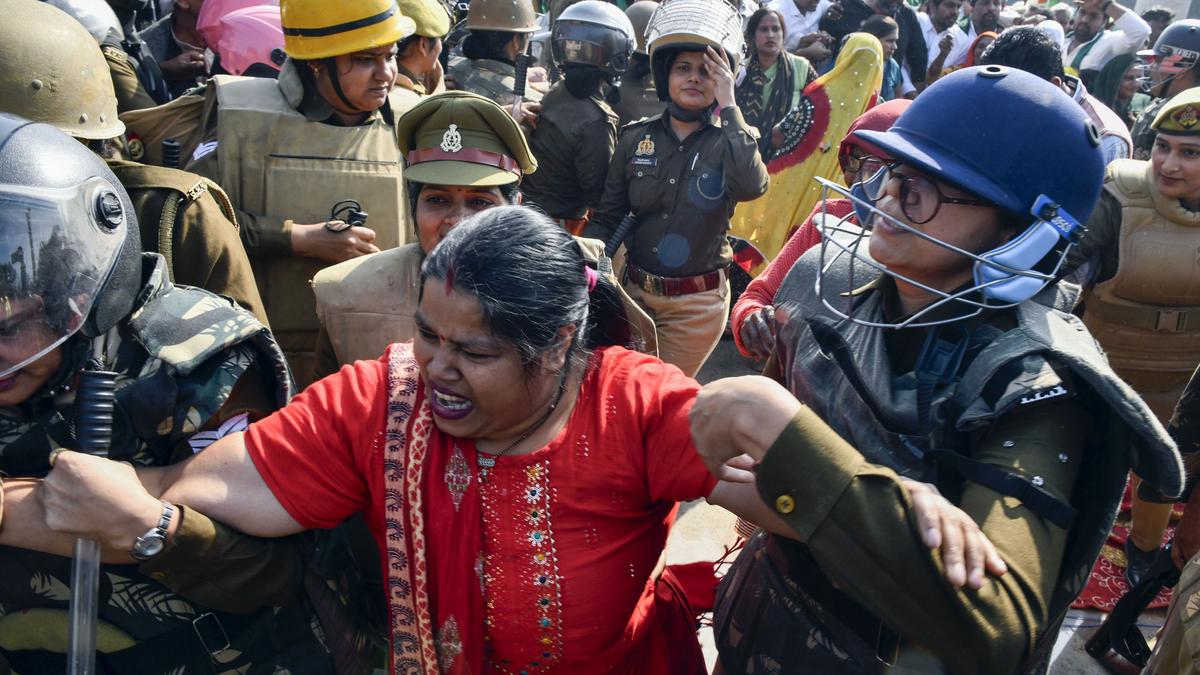 |
|
The arrest of over 160 protesting farmers in Noida, Uttar Pradesh, has ignited a firestorm of condemnation and sparked threats of a nationwide agitation. The Samyukt Kisan Morcha (SKM), a prominent farmers' union, vehemently denounced the Uttar Pradesh government's actions, characterizing the arrests as a blatant violation of the fundamental right to peaceful protest. The arrests, which took place on December 3rd, 2024, targeted farmers participating in a sit-in at the Dalit Prerana Sthal, following the disruption of their march to Delhi to demand fair land compensation and address other grievances. Among those arrested was Sukhbir Yadav ‘Khalifa’, president of the Bharatiya Kisan Parishad, highlighting the significant impact of the crackdown on farmer leadership.
The SKM's statement strongly criticized the police's forceful eviction of the protesting farmers, including over a hundred women, from the protest site. The union emphasized the urgency of judicial intervention to protect the fundamental rights of the arrested individuals. The SKM directly challenged the Uttar Pradesh Chief Minister, asserting that the use of police force cannot resolve the underlying issues of land acquisition and compensation that have fueled the farmers' discontent. The organization highlighted the disregard for a previously reached consensus with farmer leaders, which stipulated a seven-day period for the chief secretary to engage with the farmers and address their demands. Instead of dialogue, the police deployed a heavy presence and forcibly removed the peaceful protesters, underscoring the government's apparent unwillingness to negotiate.
The SKM's statement further underscored the historical context of the farmers' struggle, citing instances of police violence resulting in the deaths of six farmers in 2008, 2011, and 2012 during similar protests against land acquisition. This grim history underscores the long-standing tension between farmers and the government over land rights. The SKM recalled the enactment of the Right to Fair Compensation and Transparency in Land Acquisition, Rehabilitation and Resettlement Act 2013 (RFCTLARR Act) as a direct response to past struggles, demonstrating the government's past acknowledgement of the need for reform. However, the SKM accused the current Adityanath government of failing to uphold the principles of this act, citing the lack of land rate revisions since 2017 and the inadequate compensation offered to farmers, thereby failing to provide the employment, resettlement, and rehabilitation benefits promised under the law.
The arrests have not been met with silence. The Bharatiya Kisan Union (BKU) convened an emergency panchayat, where it was decided to escalate the protest. Plans include a peaceful demonstration at the 'Zero Point' in Gautam Buddha Nagar, with further protests planned across various districts of Uttar Pradesh. The BKU's youth wing president, Anuj Singh, outlined these plans, highlighting the coordinated effort to amplify the pressure on the government. The response from the BKU's prominent leader, Rakesh Tikait, escalated the situation further. He issued a stark warning, indicating that the ongoing protest could easily morph into a nationwide farmers' agitation if the government fails to address their concerns. Tikait stressed the importance of immediate support for the farmers in Gautam Buddh Nagar, emphasizing the gravity of the situation and the potential for widespread unrest.
Tikait's statement underscores the depth of farmer anger and the potential for widespread disruption if the government does not act decisively to resolve the land acquisition dispute. The delay in providing full compensation as mandated by the Land Acquisition Act 2013 further fueled the farmers' frustration and strengthened their resolve. The postponement of the Gautam Buddh Nagar protest until December 9th, while ostensibly offering a window for negotiation, is a strategic move that allows for continued pressure to be applied to the government while simultaneously allowing time for further mobilization and organization of larger scale protests. This suggests that the farmers are not just demanding fair compensation but also fighting for a larger recognition of their rights and the systemic changes needed to protect them from future exploitations.
The events in Noida represent more than just a local dispute; they showcase the ongoing tensions between farmers and the government in India over land acquisition and fair compensation. The widespread condemnation from farmer unions, the threat of nationwide protests, and the historical context of farmer struggles highlight the systemic issues underpinning this conflict. The resolution of this crisis demands not only addressing the immediate concerns of the arrested farmers but also implementing broader reforms to ensure the fair treatment of farmers and prevent similar conflicts from arising in the future. The coming days will be critical in determining whether the government will engage in constructive dialogue or escalate the situation further, potentially leading to widespread unrest and disruption across the country.
Source: Samyukt Kisan Morcha condemns arrest of more than 160 protesting farmers in Noida
